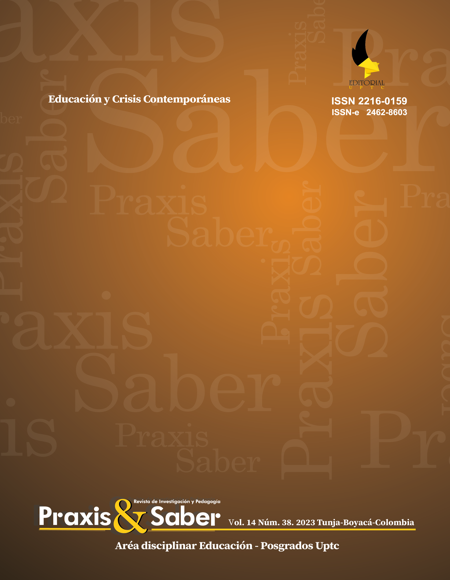Neoliberalism and crisis governmentality under post-fascism: what can education do?

Abstract
The aim of this article is to analyze the double relationship between neoliberalism—conceived in the register of a governmentality that manages functional crises in the socio-economic-political scope—and the emergence of post-fascism as a response to neoliberal disorientation. The hypothesis to analyze states that, nowadays, post-fascism has become one of the contemporary main modes of production of subjectivity. For this purpose, a bibliographic review that proposes the crisis as a way of functioning of neoliberal governmentality is privileged, showing that post-fascism promotes the very maintenance of successive crises. As a result, the following problematization is developed: what types of strategies are minimally required to make education an experiment laboratory against the post-fascist and, by extension, neoliberal conjuncture?
Keywords
neoliberalism, crisis, post-fascism, governmentality, education
Author Biography
Alexandre Filordi
Departamento de Educação
References
- Ab’Sáber, T. (2019) Crise, alucinose e mentira: o anticomunismo do nada brasileiro. En. R. de Almeida & R. Toniol (Eds.), Conservadorismo, fascismo e fundamentalismos – análises conjunturais (pp. 117-142). Editora Unicamp. DOI: https://doi.org/10.7476/9788526815025.0005
- Alliez; É. & Lazzarato, M. (2016). Wars and Capital. Semiotext(e).
- Burity, J. (2019) A onda conservadora na política brasileira traz o fundamentalismo ao poder? En. R. de Almeida & R. Toniol (Eds.), Conservadorismo, fascismo e fundamentalismos – análises conjunturais (pp. 15-66). Editora Unicamp. DOI: https://doi.org/10.7476/9788526815025.0002
- Carvalho, A. F. de. (2020a). A emersão do homo friabilis: subjetivação em tempo de cleptoafetividade. Educação e Filosofia, (33), 591-566. https://doi.org/10.14393/REVEDFIL.v33n68a2019-51962 DOI: https://doi.org/10.14393/REVEDFIL.v33n68a2019-51962
- Carvalho, A. F. de. (2020b). Foucault e o neoliberalismo de subjetividades precárias: incidências na escola pública brasileira. Revista Interinstitucional artes de educar (6), 934-956. https://doi.org/10.12957/riae.2020.54579 DOI: https://doi.org/10.12957/riae.2020.54579
- Carvalho, A. F. de. (2022). Pós-fascismo e limpeza partidária no Brasil. Folha UOL, 29 de out. https://www1.folha.uol.com.br/opiniao/2022/09/pos-fascismo-e-limpeza-partidaria-no-brasil.shtml
- Carvalho, A. F. de & Gallo, S. (2022) Do Sedentarismo ao Nomadismo: intervenções do pensamento das diferenças para a educação. Fino Traço (ebook) https://www.finotracoeditora.com.br/e-book-do-sedentarismo-ao-nomadismo-intervencoes-do-pensamento-das-diferencas-para-a-educacao
- Chamayou, G. (2020) A sociedade ingovernável: uma genealogia do liberalismo autoritário. UBU.
- Deleuze, G. & Guattari, F. (2010). O anti-Édipo. Editora 34.
- Deleuze, G. & Guattari, F. (2012). Mil platôs 3. Editora 34.
- COOPER, M. (2019). Family values – between neoliberalism and the new social conservatism. Zone Books.
- Foucault, M. (2004). Sécurité, territoire, population. Gallimard/Seuil.
- Foucault, M. (2013). L’origine de l’herméneutique de soi. Vrin.
- Foucault, M. (2015). A sociedade punitiva. WMF Martins Fontes.
- Freinet, C. (1972). Pour l’école du people. Maspero.
- Guattari, F., & Rolnik, S. (2005). Micropolíticas: Cartografias dos desejos. Vozes.
- Guattari, F. (1992). Caosmose: por um novo paradigma estético. Editora 34.
- Guattari, F. (2009). Les années d’hiver -1980-1985. Les Prairies Ordinaires.
- Guattari, F. (2013). Qu’est-ce que l’écosophie? Lignes/IMEC.
- Guattari, F. (2015). As três ecologias. Papirus.
- Guérin, D. (2021). Fascismo e grande capital. Editora UNICAMP. DOI: https://doi.org/10.7476/9788526815421
- HOSANG, D. M.; LOWNDENS, J. (2019). Producers, parasites, patriots. Race and the new right-wing politics of precarity. University of Minnesota Press. DOI: https://doi.org/10.5749/j.ctvdjrrcq
- Kinzer, S. (2006). Overthrow. America’s century of regime change – from Hawaii to Iraq. Times Books.
- Klein, N. (2007). The shock doctrine. The rise of disaster capitalism. Picador.
- Lazzarato, M. (2019). Fascismo ou revolução? Editora N-1.
- MAYER, J. (2017). Dark Money. The hidden history of the billionaires behind the rise of the radical right. Anchor Books.
- Oury, Fernand. (2001). Y a-t-il une autre loi possible dans la classe? Penf.
- Rolnik, Suely. (2018). Esferas da insurreição. Editora N-1.
- Standing, G. (2017) O precariado. A nova classe perigosa. Autêntica.
- Traverso, E. (2021). As novas faces do fascismo. Populismo e extrema direita. Âyiné.
